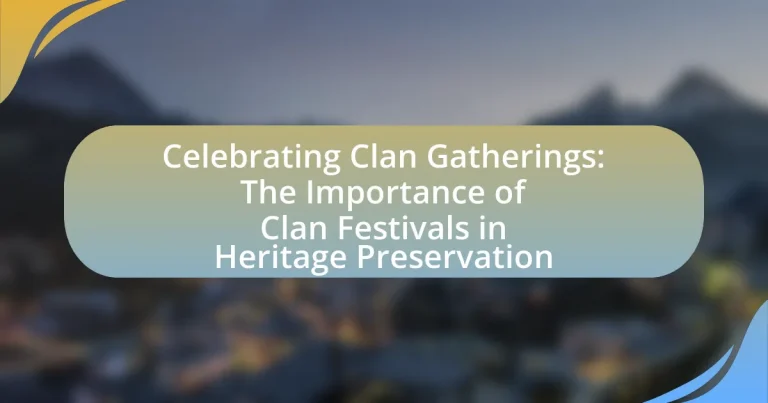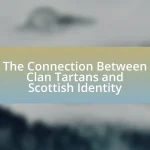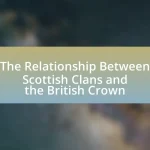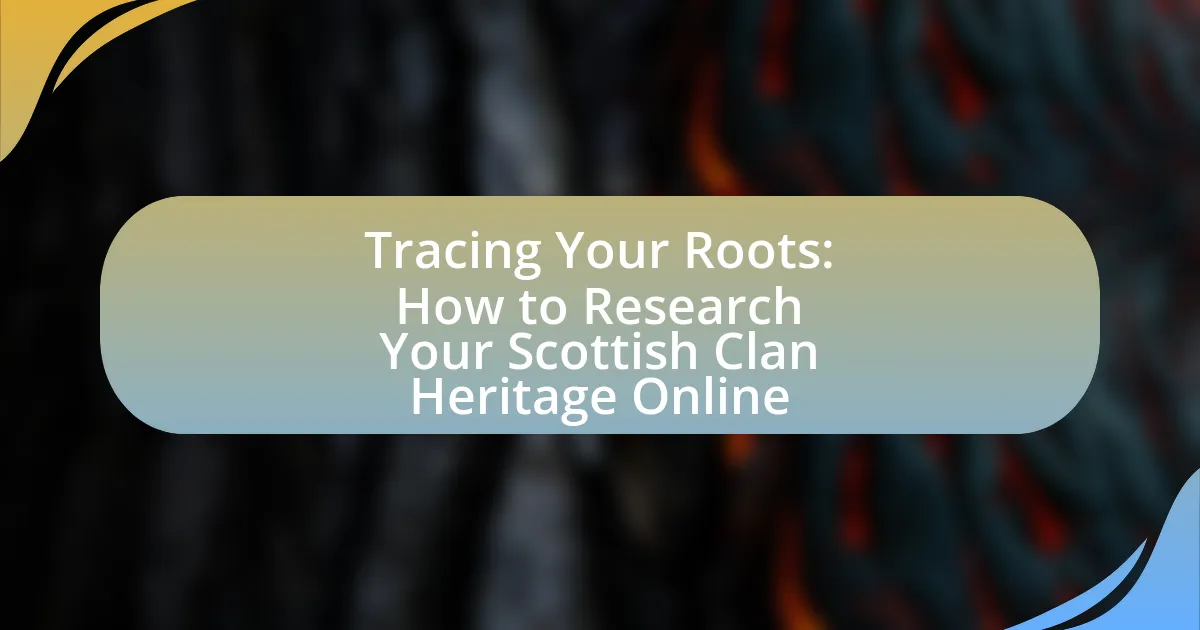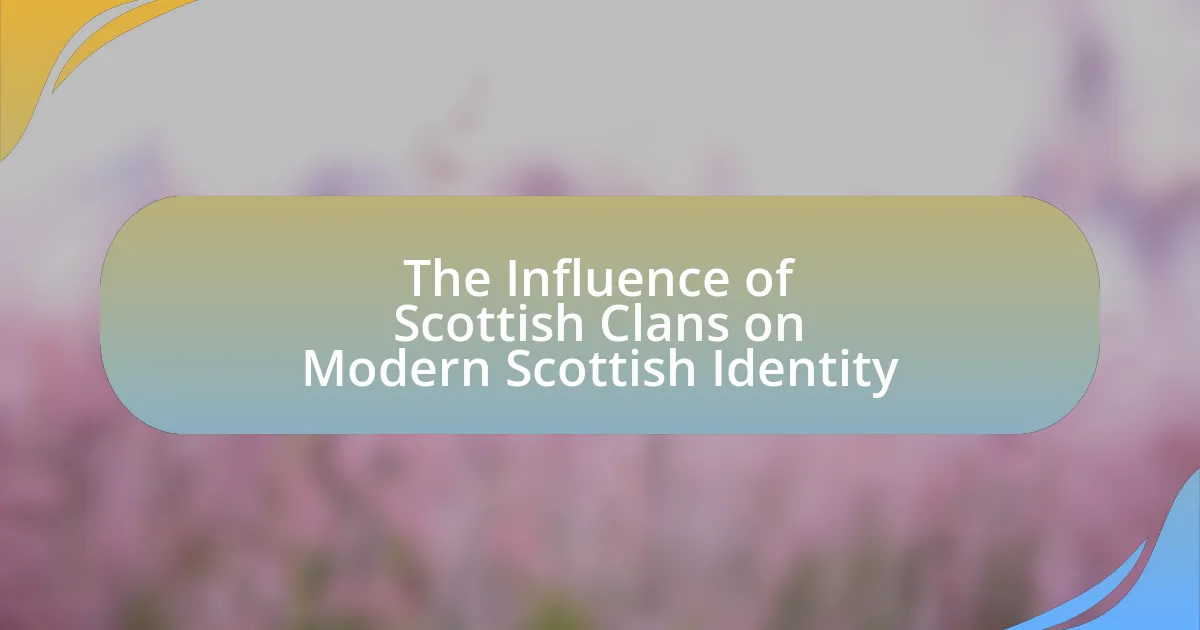Clan gatherings and festivals are organized events that celebrate the shared heritage, culture, and traditions of specific clans. These gatherings play a crucial role in preserving cultural practices, fostering intergenerational connections, and reinforcing community bonds through activities such as storytelling, traditional music and dance, and communal meals. The significance of clan festivals extends to enhancing social cohesion, promoting cultural identity, and contributing to local economies. However, modern challenges such as declining participation and cultural dilution necessitate adaptations, including the use of technology and sustainable practices, to ensure the continued relevance and success of these vital cultural events.
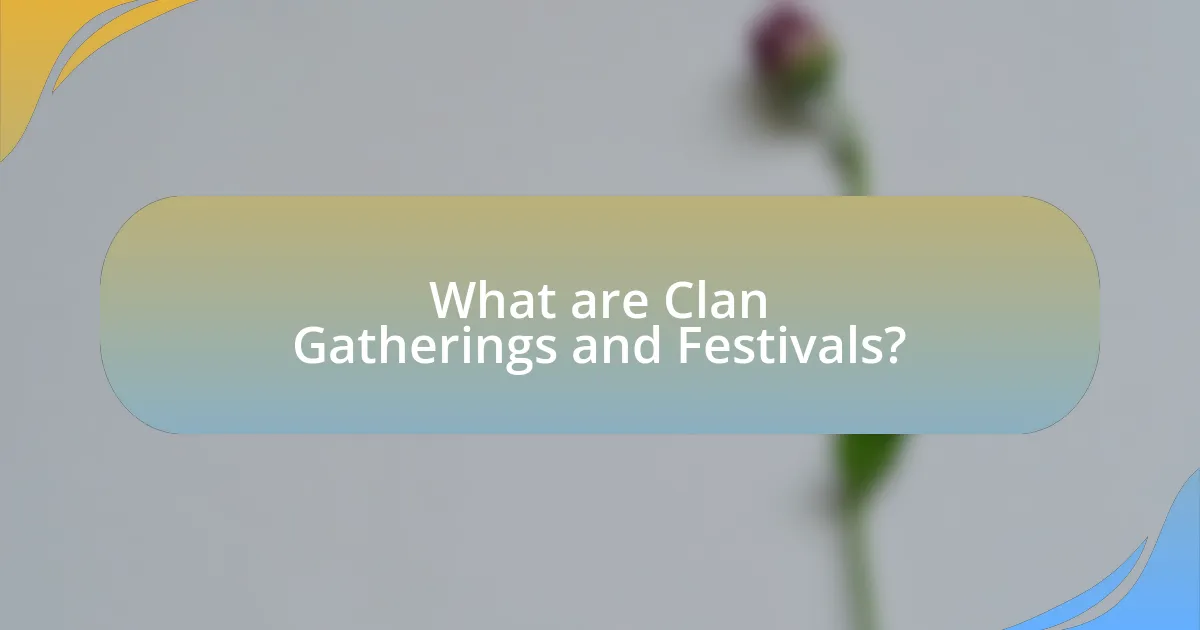
What are Clan Gatherings and Festivals?
Clan gatherings and festivals are organized events where members of a specific clan come together to celebrate their shared heritage, culture, and traditions. These gatherings often include activities such as storytelling, traditional music and dance, food sharing, and various cultural performances that reinforce clan identity and community bonds. Historically, such events have served as a means of preserving cultural practices and fostering intergenerational connections, ensuring that the clan’s history and values are passed down. For example, the Scottish Clan Gathering, which occurs annually, showcases traditional games and ceremonies that highlight the clan’s lineage and customs, thereby playing a crucial role in heritage preservation.
Why are Clan Gatherings significant in cultural heritage?
Clan gatherings are significant in cultural heritage because they serve as vital events for preserving and transmitting traditions, values, and identities within a community. These gatherings facilitate intergenerational connections, allowing older members to share stories, customs, and practices with younger generations, thereby ensuring the continuity of cultural knowledge. For instance, many clan gatherings include traditional ceremonies, dances, and rituals that reflect the unique history and beliefs of the clan, reinforcing a sense of belonging and cultural pride among participants. Additionally, research indicates that such events contribute to social cohesion and community resilience, as they foster relationships and networks among members, which are essential for cultural survival.
What role do Clan Festivals play in community bonding?
Clan festivals play a crucial role in community bonding by fostering connections among members through shared cultural practices and traditions. These events provide opportunities for individuals to engage in communal activities, reinforcing social ties and collective identity. For instance, clan festivals often include traditional music, dance, and storytelling, which serve to transmit cultural heritage and strengthen intergenerational relationships. Research indicates that participation in such communal gatherings enhances social cohesion, as evidenced by studies showing increased feelings of belonging and support among attendees.
How do Clan Gatherings reflect historical traditions?
Clan gatherings reflect historical traditions by serving as a platform for the preservation and celebration of cultural heritage. These events often include rituals, storytelling, music, and dance that have been passed down through generations, reinforcing the identity and values of the clan. For instance, many clans incorporate traditional attire and ancestral ceremonies that highlight their unique histories and customs, thereby fostering a sense of belonging and continuity. Historical records indicate that such gatherings have been integral to maintaining social bonds and cultural practices, as seen in various indigenous and ethnic communities worldwide.
What types of activities are typically included in Clan Festivals?
Clan festivals typically include traditional games, cultural performances, storytelling, and communal meals. These activities serve to strengthen clan identity and foster connections among members. For instance, traditional games like tug-of-war or relay races promote teamwork and camaraderie, while cultural performances such as music and dance showcase the clan’s heritage. Storytelling sessions often feature historical narratives that preserve clan history, and communal meals provide an opportunity for members to bond over shared culinary traditions. These activities collectively reinforce the significance of heritage preservation within clan gatherings.
What traditional performances are showcased during these events?
Traditional performances showcased during clan festivals include folk dances, storytelling, and music specific to the clan’s heritage. Folk dances often reflect the cultural history and values of the clan, while storytelling preserves oral traditions and historical narratives. Music, including traditional instruments and songs, enhances the communal experience and fosters a sense of identity among participants. These performances are integral to the celebration of clan heritage, reinforcing cultural continuity and community bonds.
How do culinary traditions feature in Clan Gatherings?
Culinary traditions play a central role in Clan Gatherings by serving as a means of cultural expression and community bonding. Traditional dishes often reflect the historical and geographical backgrounds of the clan, reinforcing a sense of identity and continuity among members. For instance, specific recipes passed down through generations not only preserve culinary heritage but also facilitate storytelling and sharing of clan history during these gatherings. This connection to food is evidenced by the inclusion of regional specialties that highlight local ingredients and cooking methods, which are integral to the clan’s cultural narrative.
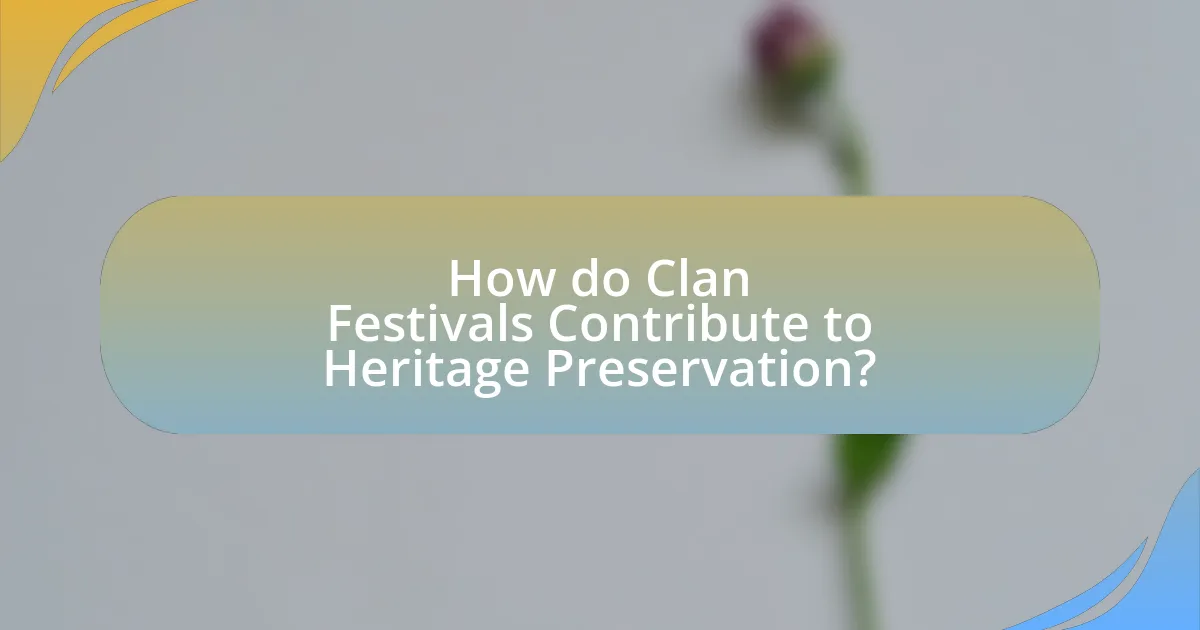
How do Clan Festivals Contribute to Heritage Preservation?
Clan festivals contribute to heritage preservation by serving as vital platforms for the transmission of cultural traditions, values, and historical narratives. These events facilitate intergenerational knowledge sharing, allowing older clan members to pass down stories, customs, and practices that define their identity. For instance, clan festivals often include traditional music, dance, and rituals that have been practiced for generations, reinforcing a sense of belonging and continuity within the community. Additionally, studies have shown that such gatherings enhance community cohesion and pride, which are essential for maintaining cultural heritage. By actively engaging participants in these cultural expressions, clan festivals ensure that heritage is not only remembered but also celebrated and adapted for future generations.
In what ways do Clan Gatherings promote cultural identity?
Clan Gatherings promote cultural identity by providing a platform for the expression and reinforcement of shared traditions, values, and histories among members. These events facilitate the transmission of cultural practices, such as storytelling, music, and dance, which are integral to the clan’s heritage. For instance, during gatherings, participants often engage in rituals and ceremonies that reflect their ancestral customs, thereby strengthening their collective identity. Additionally, Clan Gatherings serve as a space for intergenerational dialogue, allowing elders to pass down knowledge and cultural narratives to younger members, ensuring the continuity of cultural identity over time.
How do these events educate younger generations about their heritage?
Clan festivals educate younger generations about their heritage by providing immersive experiences that connect them to their cultural history. These events often feature traditional music, dance, storytelling, and crafts, which serve as practical demonstrations of ancestral customs and values. For instance, participation in clan gatherings allows youth to engage directly with elders who share personal narratives and historical insights, reinforcing a sense of identity and belonging. Research indicates that such intergenerational interactions are crucial for cultural transmission, as they foster a deeper understanding of one’s roots and the significance of heritage in contemporary society.
What impact do Clan Festivals have on local economies?
Clan Festivals significantly boost local economies by attracting tourism, increasing local spending, and creating job opportunities. These events draw participants and visitors who spend money on accommodations, food, and local crafts, thereby stimulating various sectors such as hospitality and retail. For instance, a study by the University of Edinburgh found that clan gatherings can generate millions in revenue for host communities, highlighting their economic importance. Additionally, local businesses often see a surge in sales during these festivals, which can lead to seasonal employment opportunities and long-term economic benefits for the area.
How do Clan Festivals foster intergenerational connections?
Clan festivals foster intergenerational connections by providing a communal space where individuals of all ages can engage in shared cultural practices and traditions. These events often include storytelling, music, and dance, which are integral to the clan’s heritage, allowing older generations to pass down knowledge and values to younger members. For instance, research indicates that participation in such festivals enhances familial bonds and promotes cultural continuity, as seen in studies highlighting the role of traditional gatherings in maintaining cultural identity across generations.
What activities encourage participation from all age groups?
Activities that encourage participation from all age groups include community games, storytelling sessions, and cultural performances. Community games, such as tug-of-war or relay races, foster teamwork and inclusivity, allowing individuals of varying ages to engage together. Storytelling sessions appeal to both younger and older generations, as they share cultural narratives that resonate across age divides. Cultural performances, like traditional dances or music showcases, invite participation and appreciation from all attendees, enhancing intergenerational connections. These activities not only promote engagement but also strengthen community bonds, making them effective in clan gatherings aimed at heritage preservation.
How do storytelling and oral traditions play a role in these gatherings?
Storytelling and oral traditions are central to clan gatherings as they serve to transmit cultural values, history, and identity among members. These narratives reinforce communal bonds by sharing collective experiences and wisdom, often through rituals and performances that engage participants. For instance, oral traditions can include recounting ancestral tales, which not only preserve the clan’s heritage but also educate younger generations about their lineage and cultural practices. This method of knowledge transfer has been documented in various anthropological studies, highlighting its significance in maintaining cultural continuity and fostering a sense of belonging within the community.
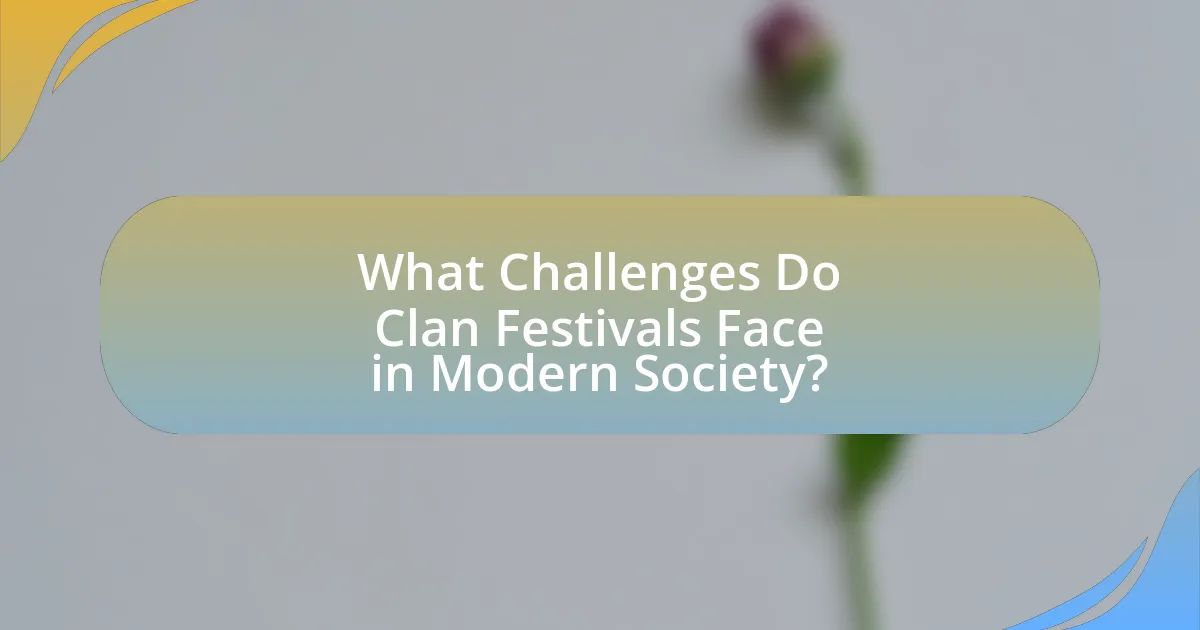
What Challenges Do Clan Festivals Face in Modern Society?
Clan festivals face significant challenges in modern society, including declining participation, cultural dilution, and financial sustainability. Declining participation is evident as younger generations often prioritize other forms of entertainment over traditional gatherings, leading to reduced attendance. Cultural dilution occurs when the original significance and practices of clan festivals are overshadowed by contemporary influences, resulting in a loss of authenticity. Financial sustainability is a pressing issue, as many festivals struggle to secure funding and sponsorship, making it difficult to cover operational costs and maintain quality. These challenges threaten the preservation of heritage and the communal bonds that clan festivals aim to strengthen.
How are Clan Gatherings adapting to contemporary issues?
Clan gatherings are adapting to contemporary issues by incorporating digital technology and addressing social concerns such as inclusivity and environmental sustainability. Many clans now utilize online platforms for virtual gatherings, allowing members from diverse geographical locations to participate, which enhances accessibility and engagement. Additionally, clan festivals are increasingly focusing on sustainable practices, such as reducing waste and promoting local artisans, to align with modern environmental values. This shift not only preserves cultural heritage but also resonates with younger generations who prioritize social responsibility.
What are the effects of globalization on Clan Festivals?
Globalization significantly impacts clan festivals by introducing diverse cultural influences and altering traditional practices. As clans interact with global cultures, they may incorporate new elements into their festivals, leading to a blend of traditional and modern practices. For instance, the inclusion of international music, food, and dance styles can enhance the appeal of clan festivals, attracting a broader audience. However, this fusion can also risk diluting the original cultural significance and authenticity of the festivals. Research indicates that while globalization can promote cultural exchange, it may simultaneously threaten the preservation of unique cultural identities, as seen in various communities worldwide.
How do Clan Gatherings address the needs of diverse community members?
Clan Gatherings address the needs of diverse community members by fostering inclusivity and cultural representation. These events provide a platform for individuals from various backgrounds to share their traditions, stories, and experiences, thereby promoting understanding and respect among different cultural groups. For instance, Clan Gatherings often feature activities such as workshops, performances, and discussions that highlight the unique aspects of each community’s heritage, ensuring that all voices are heard and valued. This approach not only strengthens community bonds but also enhances the overall cultural richness of the gathering, making it a vital space for celebrating diversity and preserving heritage.
What strategies can be implemented to enhance Clan Festivals?
To enhance Clan Festivals, organizers can implement strategies such as incorporating interactive cultural workshops, promoting local artisans, and utilizing social media for outreach. Interactive workshops allow participants to engage with their heritage through hands-on activities, fostering a deeper connection to their clan’s traditions. Promoting local artisans not only supports the community but also enriches the festival experience by showcasing unique crafts and foods that reflect the clan’s culture. Utilizing social media platforms can significantly increase attendance and engagement by reaching a broader audience, allowing for real-time updates and community interaction. These strategies are supported by studies indicating that community involvement and cultural engagement lead to higher satisfaction and participation rates in heritage events.
How can technology be utilized to promote Clan Gatherings?
Technology can be utilized to promote Clan Gatherings by leveraging social media platforms, event management software, and virtual communication tools. Social media platforms like Facebook and Instagram enable clans to create event pages, share updates, and engage with members, increasing visibility and participation. Event management software, such as Eventbrite, allows for streamlined registration and ticketing, making it easier for attendees to sign up and for organizers to manage logistics. Additionally, virtual communication tools like Zoom or Microsoft Teams can facilitate planning meetings and discussions, ensuring that members can collaborate regardless of geographical barriers. These technological solutions enhance outreach, streamline organization, and foster community engagement, ultimately leading to more successful Clan Gatherings.
What best practices can ensure the sustainability of Clan Festivals?
To ensure the sustainability of Clan Festivals, it is essential to implement community engagement, financial planning, and environmental stewardship. Community engagement fosters local participation and ownership, which can be seen in successful festivals that involve clan members in planning and execution, thereby enhancing cultural pride and attendance. Financial planning, including diversified funding sources such as sponsorships, grants, and ticket sales, is crucial; for instance, festivals that secure multiple funding streams tend to have greater longevity. Environmental stewardship, which includes waste reduction and sustainable practices, is increasingly important; festivals that adopt eco-friendly measures, such as recycling and using local resources, not only reduce their ecological footprint but also attract environmentally conscious attendees. These practices collectively contribute to the long-term viability and relevance of Clan Festivals in preserving heritage.
What are the key takeaways for organizing successful Clan Festivals?
Key takeaways for organizing successful Clan Festivals include thorough planning, community engagement, and cultural representation. Effective planning involves setting clear objectives, budgeting, and scheduling activities that resonate with clan members. Engaging the community ensures participation and fosters a sense of belonging, which can be achieved through surveys or meetings to gather input. Cultural representation is crucial; showcasing traditional music, food, and customs reinforces heritage and attracts attendees. According to a study by the University of Edinburgh, festivals that prioritize community involvement and cultural authenticity see a 30% increase in attendance and participant satisfaction.
